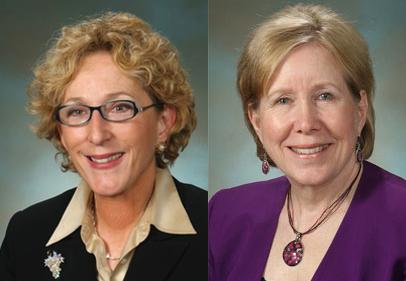Midsession, state budget comes to the forefront
The 36th District's Mary Lou Dickerson and Jeanne Kohl-Welles report on the state budget and their legislation at the midpoint of the current legislative session.
Sat, 02/27/2010
With less than two weeks left in the current state legislative session, the 2010 budget is taking center stage.
The senate and the house of representatives released their supplemental operating budget proposals Feb. 23.
State legislators will spend the bulk of the rest of the session, which ends March 11, on passing the budget, 36th District Sen. Jeanne Kohl-Welles said.
The senate's proposal attempts to make up for the $2.6 billion revenue shortfall since the 2009 session with $1.1 billion in federal funds and fund transfers, Kohl-Welles said.
In addition, the proposal cuts services and public employee compensation by $838 million and raises $918 million in new revenue, she said.
Kohl-Welles said even if the senate's budget is passed as is, it would still bring the total to $5 billion in cuts, the most in state history, with only $918 million in new revenue over a two-year period.
"These cuts have a major impact on our students in our public schools and colleges and those in need of essential services," she said.
The house of representatives' proposed budget includes $850 million in new revenue, 36th District Rep. Mary Lou Dickerson said. Even with that, the state will have a smaller budget than the previous year for the first time since 1951 and revenue collections will be lower than in 2005.
Dickerson said she is not proud of those stats, but claims by individuals that the state is raising taxes higher and higher and spending more and more are incorrect.
"Political timidity has already allowed the deep but temporary recession to do too much damage to our education funding and other priorities," she said.
Kohl-Welles said the majority of new revenue in the senate's proposed budget comes from closing more than two dozen tax loopholes.
She introduced a bill to end tax exemptions for membership in private clubs and cosponsored a bill that woudl raise $518 million by narrowing or eliminating numerous tax loopholes.
"The legislature rarely questions whether tax exemptions are still effective and fulfill the purpose for which they were intended," Kohl-Welles said.
The senate budget proposal calls for a 49.3 percent increase in tobacco taxes, amounting to a $1 increase for a pack of cigarettes, and a three-year 0.3 percent sales tax increase, resulting in a King County sales tax of 10 percent.
Kohl-Welles said she is opposed to the sales tax increase because Washingtonians in the lowest 20 percent of the tax bracket pay 17 percent of their annual income in state taxes while individuals in the top 20 percent of the tax bracket pay less than 3 percent.
"I am very troubled by expanding the sales tax as it is the most regressive and unsustainable of all taxes," she said.
Kohl-Welles introduced a bill that would place a 1 percent income tax on high-earners, giving some relief to low-income and middle-class residents, but said the it is unlikely to move forward this session.
She said she was also disappointed that her bill to extend the sales tax to gum and candy was not included in the budget. The bill would have sent new revenue to community health centers to provide medical and dental care to low-income people and reduced consumption of foods that lead to obesity and diet-related diseases, she said.
After voting for a 2009 budget that included cuts but no new revenue sources, Kohl-Welles said she vowed to work tirelessly to ensure a balanced and fair 2010 budget that included a revenue package.
"I don't know at this point whether my objectives will be reached," she said. "If not, I fear the long-term, unintended consequences for our citizens and our economy will be steep."
Dickerson said she is hopeful about the rest of the session as legislators start to focus entirely on the new budget and revenue proposals.
"The big issue that towers over the details and specific dollar amounts is whether we can pass a major revenue package that will keep our priorities funded," Dickerson said.
She said she has been busy dashing between the senate and the house trying to keep her priorities funded and moving forward.
Dickerson said while she is battling to keep her Security Lifeline reforms moving through the senate, she is simultaneously battling house Republicans who are trying to strip all funding for the reforms from the budget.
"It feels like trying to light a fire under some people with one hand to incite progress while putting out threatening fires with the other hand," she said.
She said Security Lifeline reforms are critical to saving some of the human services safety net during the budget crisis.
Dickerson said her bill for Involuntary Treatment Act reforms to get people with severe mental illness treatment, while protecting them and the public, is getting strong public and editorial support.
She said she is excited that after years of work, her bill banning Bisphenol A in children's products looks poised to become law.
Kohl-Welles said she has seen a number of victories so far this session.
For example, her bill, along with a companion bill by 36th District Rep. Reuven Carlyle, that would create a minor tax exemption for educational exhibits for zoos and aquariums is still under consideration.
Download the file at right to see a larger list of bills sponsored by Kohl-Welles and Dickerson that are still alive this session.


